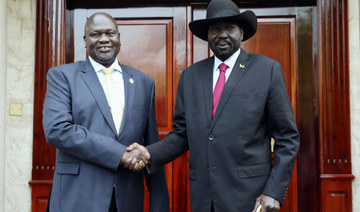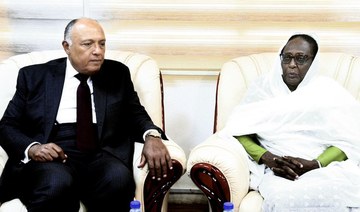WAD RAMLI, Sudan: In Wad Ramli, a village outside the Sudanese capital of Khartoum, Alsamani Fathalrahman and his neighbors traveled in blue speedboats through flooded streets trying to salvage their belongings.
“In just five hours, the area was completely flooded, with no prior notice, so people could only save themselves,” Fathalrahman said, as the 27-year-old engineer recovered bed frames and school books from abandoned homes.
The flooding that has killed scores of people and destroyed more than 100,000 homes is the first crisis to test Sudan’s new prime minister, the African country’s first civilian leader in 30 years.
Prime Minister Abdalla Hamdok’s August 21 inauguration raised hopes that the new civilian-led government would mean a fresh approach, including being more responsive to the needs of the Sudanese people.
But Hamdok is hamstrung by an economy crippled by debt and a legacy of under investment in infrastructure that has exacerbated the flood crisis.
The communities hit by the floods, which started in July, have been mostly left to fend for themselves or rely on aid with little help from authorities, just as they did under the previous regime, according to residents, community groups and charity workers.
“The civilian government is right now an abstract notion,” said Magdi El Gizouli, a Sudanese academic based in Germany and fellow of the Rift Valley Institute, a non-profit research organization. “It will emerge eventually but whether it can exercise power is a totally different story.”
The prime minister’s office and the military declined to comment on the flood response.
The flood crisis comes at a time of huge transition for Sudan, as months of protests ushered in a transitional government that must also tackle a full-blown economic crisis and internal conflicts, issues that helped bring down the three-decade rule of Omar Al-Bashir.
Hamdok’s cabinet was sworn in on Sunday; civilian state governors are yet to be appointed.
In an interview with Reuters days after his inauguration, Hamdok said the flood situation required “immediate and strategic intervention” and that “the government must put in place solutions and plans to ensure that the harm to citizens from floods and rains does not repeat.”
He has announced the formation of a task force to focus on the flood-relief effort and said Sudan should follow the lead of other countries by building damns, channels and other ways to make use of the water. ADMINISTRATIVE VOID
During a visit to Wad Ramli in late August, Hamdok was interrupted by chants from residents demanding that they be resettled to avoid a repeat of situation in the future.
“I hear you very well,” he responded. “Together we will execute this resettlement plan. You have to help us with suggestions.”
Under the power-sharing arrangement between the military council and the main opposition coalition, Hamdok will head a transitional government for just over three years, until an election.
But the formation of the government, which was supposed to be in place by the end of last month, was repeatedly delayed due to political wrangling over cabinet appointments as well as months of negotiations between the military and the main opposition coalition.
Hamdok has apologized for the delay.
That has left a void for the country’s most powerful paramilitary group, the large and well-financed Rapid Support Forces (RSF), to fill in terms of the flood response, said academic Gizouli.
RSF commander General Mohamed Hamdan Dagalo, who is known as Hemedti, is seen by analysts as the most powerful member of the newly-established sovereign council, the joint military-civilian body that oversees to the prime minister and the cabinet. The RSF has also been accused by protesters and rights groups of involvement in killing demonstrators, something Hemedti has previously denied.
The military has supplied some flood assistance, including mattresses and tents, according to state media and residents.
NEIGHBOURHOOD GROUPS
Help has instead come from charities and international organizations like the United Nations, including medical supplies and transport, according to residents and the organizations. Gulf countries including Kuwait and Qatar have also provided assistance.
Khartoum-based charity Nafeer has provided tents, mosquito nets, food, toiletries, and construction equipment to flood hit areas across the country, according to Ghazi Elrayah, a volunteer with the charity who focuses on external communication.
The response from the authorities has been “very weak. It hasn’t really changed this year,” said Elrayah. “We do the emergency relief for this country. What we are doing is not a permanent solution,” Elrayah added.
Joining the flood-relief effort across Khartoum are what are known as neighborhood resistance committees that had previously focused on mobilizing communities to join the anti-Bashir protests that led to his ouster.
The committees are helping distribute supplies they have received largely through donations, and are working with groups like Nafeer, which has provided equipment to dig ditches.
That includes neighborhoods in the region known as Khartoum’s “southern belt” that have been particularly hard hit because of the large number of slums, which are easily demolished by the floods.
A member of one of the committees there, who wished to be identified only by his last name Osman due to security concerns, said the committee had approached local authorities, hoping for supplies and equipment to help dig ditches.
“We didn’t get anything from them. Nothing, no aid,” Osman said. He added that the committees are now focusing on battling waterborne illnesses like malaria, which are spreading as a result of the flooding.
Mohamed Ali Alshareef, general manager for the Jebel Awlia local authority that includes the southern belt, said the authority provided some tents, pesticides and drainage services but that the political changes had impacted its finances.
“The situation was above our capacity,” he said.
Sudan’s major floods present first challenge for its new leader
Sudan’s major floods present first challenge for its new leader
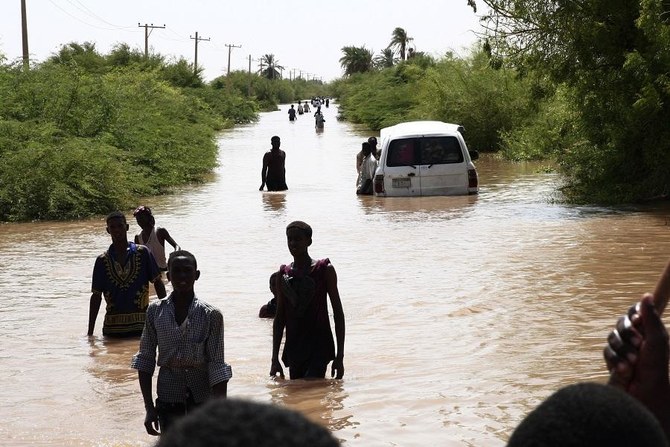
- The flooding that has killed scores of people and destroyed more than 100,000 homes is the first crisis to test Sudan’s new PM
- The communities hit by the floods, which started in July, have been mostly left to fend for themselves or rely on aid with little help from authorities
Dubai carrier Emirates suspends check-in for onward connections, flydubai cancels Iran flights

- Emirates suspends check-in for all customers in its network travelling with onward connections through Dubai
DUBAI: Dubai’s flydubai airline canceled flights to Iran on Friday after receiving an official alert, a statement said.
“In line with the issued NOTAM (notice to air missions), our flights to Iran today have been canceled,” said the statement
One flight which had already departed for Tehran returned to Dubai after the Iranian capital’s airport was closed, it added.
Flights were suspended across swathes of Iran as Iranian state media reported explosions in the central province of Isfahan.
Flight-tracking software showed commercial flights avoiding western Iran, including Isfahan, and skirting Tehran to the north and east.
Emirates meanwhile said on Friday it was suspending check-in for all customers in its network travelling with onward connections through Dubai until 2359 GMT on April 19.
Emirates, one of the world’s biggest international airlines, added that customers travelling to Dubai as their final destination may check-in and travel as usual.
Emirates and flydubai have experienced serious disruption this week after record rainfall caused more than 1,000 flight cancelations at Dubai airport, one of the world’s busiest air hubs.
Iran closes air space, commercial flights diverted after apparent Israeli retaliatory strikes

- Drones shot down over Isfahan, says Iranian state media
- Israel military refuses to comment on incident
DUBAI/WASHINGTON: Israeli missiles have hit a site in Iran, ABC News reported late on Thursday, citing a US official, while Iranian state media reported an explosion in the center of the country, days after Iran launched a retaliatory drone strike on Israel.
Commercial flights began diverting their routes early Friday morning over western Iran without explanation as one semiofficial news agency in the Islamic Republic claimed there had been “explosions” heard over the city of Isfahan.
Some Emirates and Flydubai flights that were flying over Iran early on Friday made sudden sharp turns away from the airspace, according to flight paths shown on tracking website Flightradar24.
“Flights over Isfahan, Shiraz and Tehran cities have been suspended,” state media reported.
Iranian officials said its air defenses did shot down several drones but there had been “no missile attack for now” on the country.
The state-run IRNA news agency reported that Iran fired air defense batteries early Friday morning across several provinces after reports of explosions near the city of Isfahan.
Several drones “have been successfully shot down by the country’s air defense, there are no reports of a missile attack for now,” Iran’s space agency spokesman Hossein Dalirian says on X.
The Fars news agency said “three explosions” were heard near the Shekari army airbase near Isfahan.
Iran’s local media also reported that nuclear facilities in Isfahan were “completely secure” after explosions were heard near the area.
“Nuclear facilities in Isfahan province are completely secure,” Tasnim news agency reports, quoting “reliable sources.”
Israel had said it would retaliate against Iran’s weekend attack, which involved hundreds of drones and missiles in retaliation for a suspected Israeli strike on its embassy compound in Syria. Most of the Iranian drones and missiles were downed before reaching Israeli territory.
Several Iranian nuclear sites are located in Isfahan province, including Natanz, centerpiece of Iran’s uranium enrichment program. Isfahan, Isome 350 kilometers (215 miles) south of Iran’s capital, Tehran, is also home to a major air base for the Iranian military.
Meanwhile in Iraq where a number of Iranian-backed militias are based, residents in Baghdad reported hearing sounds of explosions, but the source of the noise was not immediately clear.
In Syria, a local activist group said strikes hit an army position in the south of the country Friday.
“There were strikes on a Syrian army radar position,” said Rayan Maarouf, who runs the Suwayda24 anti-government website that covers news from Sweida province in the south.
Iranian military positions in Syria had been frequently targetted by Israeli air strikes over the past years. Early this month, an Israeli strike demolished a consular building annex of the Iranian Embassy in Sydia's capital Damascus, killing 13 people, including two generals of Iran's Revolutionary Guards, triggering the Iranian missiles and drones attack on Israel on April 13.
At the United Nations Security Council on Thursday, Iran urged member nations that Israel “must be compelled to stop any further military adventurism against our interests” as the UN secretary-general warned that the Middle East was in a “moment of maximum peril.”
Israel had said it was going to retaliate against Iran’s April 13 missile and drone attack.
Analysts and observers have been raising concerns about the risks of the Israel-Gaza war spreading into the rest of the region.
Oil prices and jumped on the reports of the Israeli strike. Brent crude futures rose 2 percent to $88.86 a barrel, the dollar gained broadly, gold rose 1 percent and S&P 500 futures dropped 1 percent.
Israel’s assault on Gaza began after Palestinian Islamist group Hamas attacked Israel on Oct. 7, killing 1,200, according to Israeli tallies.
Israel’s military offensive has killed over 33,000 Palestinians in Gaza, according to the local health ministry.
Iran-backed groups have declared support for Palestinians, launching attacks from Lebanon, Yemen and Iraq.
United States had advance warning of Israel attack on Iran: US media
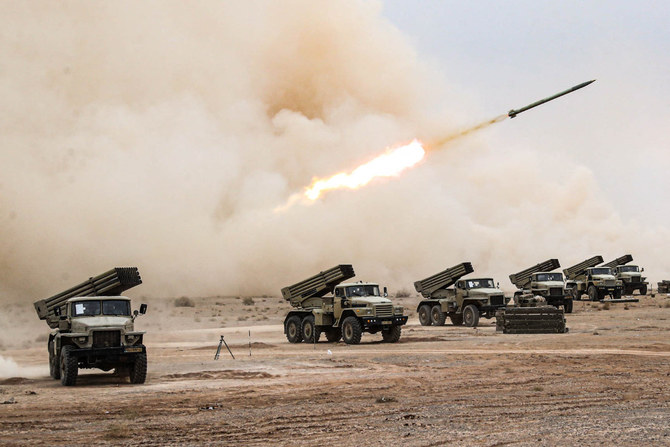
- US media: Israel had provided Washington with pre-notification of the strike
- Tehran’s two major airports resumed flights following a brief suspension
DUBAI/WASHINGTON/TEHRAN: The United States received advance notice of Israel’s reported strike on Iran but did not endorse the operation or play any part in its execution, US media quoted officials as saying.
NBC and CNN, citing sources familiar with the matter and a US official, respectively, said Israel had provided Washington with pre-notification of the strike.
Various networks cited officials confirming a strike had taken place inside Iran, with CNN quoting one official as stating the target was not a nuclear facility.
Israel told the United States on Thursday it would be retaliating against Iran in the coming days, a senior US official told CNN.
“We didn’t endorse the response,” the official said, according to CNN.
There was no immediate comment from the White House about the Israeli strike.
In response to a query from AFP, the Pentagon duty desk said: “We do not have anything to offer at this time.”
Iran activated its air defense system over several cities, state media reported, after the country’s official broadcaster said explosions were heard near the central city of Isfahan.
Israel warned it would hit back after Iran fired hundreds of missiles and drones at its arch-foe over the weekend. Most of them were intercepted.
That weekend barrage came in the wake of an attack on Iran’s consulate in Damascus widely blamed on Israel.
Tehran’s two major airports resumed flights on Friday, state media reported, following a brief suspension after explosions were heard in central Iran.
“Flights through Imam Khomeini and Mehrabad airports have resumed,” the official IRNA news agency reported.
Commercial flights began diverting their routes early Friday morning over western Iran without explanation as one semiofficial news agency in the Islamic Republic claimed there had been “explosions” heard over the city of Isfahan.
Some Emirates and Flydubai flights that were flying over Iran early on Friday made sudden sharp turns away from the airspace, according to flight paths shown on tracking website Flightradar24.
“Flights over Isfahan, Shiraz and Tehran cities have been suspended,” state media reported.
Iranian officials said its air defenses did shot down several drones but there had been “no missile attack for now” on the country.
The state-run IRNA news agency reported that Iran fired air defense batteries early Friday morning across several provinces after reports of explosions near the city of Isfahan.
Several drones “have been successfully shot down by the country’s air defense, there are no reports of a missile attack for now,” Iran’s space agency spokesman Hossein Dalirian says on X.
The Fars news agency said “three explosions” were heard near the Shekari army airbase near Isfahan.
Iran’s local media also reported that nuclear facilities in Isfahan were “completely secure” after explosions were heard near the area.
“Nuclear facilities in Isfahan province are completely secure,” Tasnim news agency reports, quoting “reliable sources.”
Israel had said it would retaliate against Iran’s weekend attack, which involved hundreds of drones and missiles in retaliation for a suspected Israeli strike on its embassy compound in Syria. Most of the Iranian drones and missiles were downed before reaching Israeli territory.
Several Iranian nuclear sites are located in Isfahan province, including Natanz, centerpiece of Iran’s uranium enrichment program. Isfahan, Isome 350 kilometers (215 miles) south of Iran’s capital, Tehran, is also home to a major air base for the Iranian military.
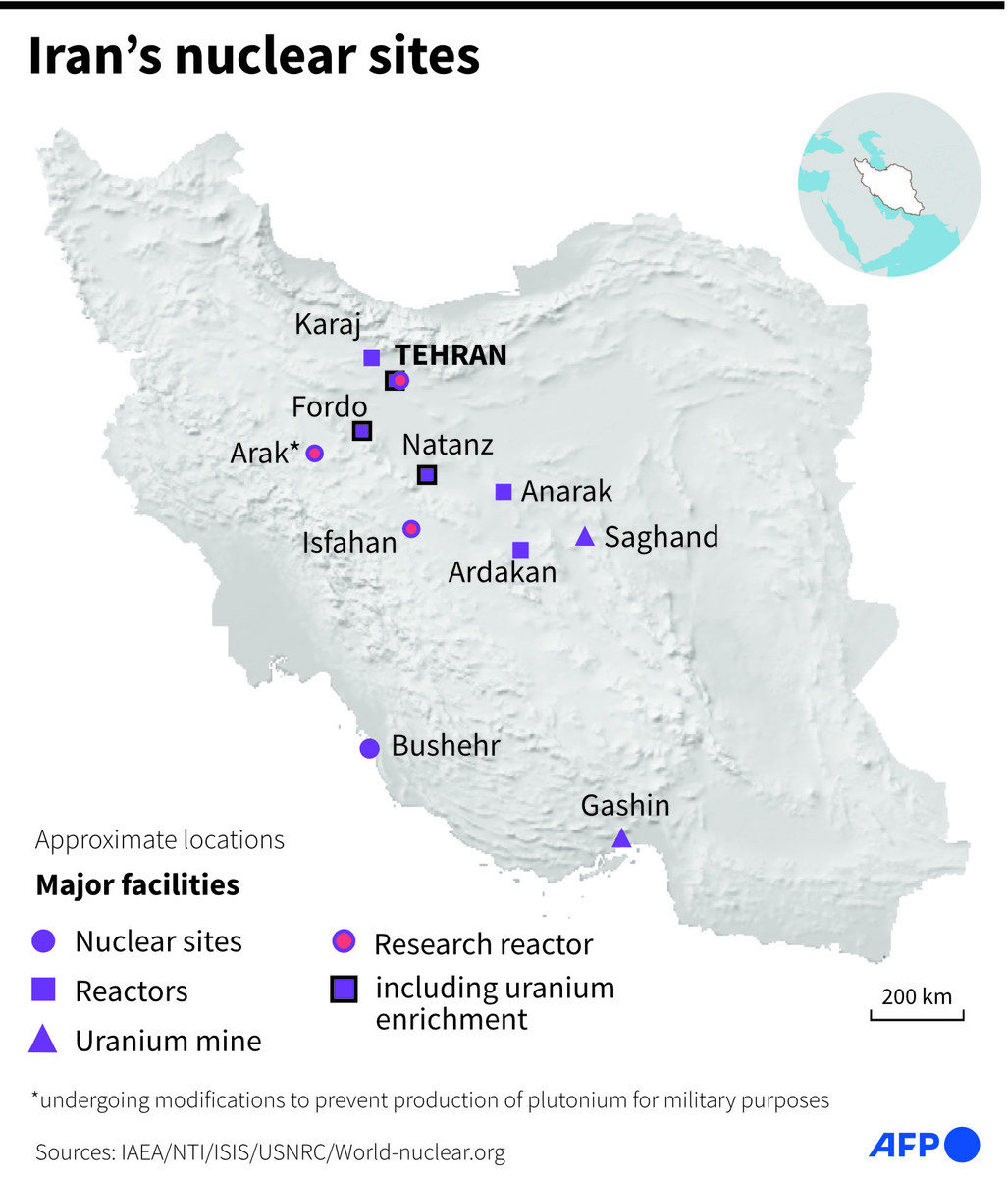
Meanwhile in Iraq where a number of Iranian-backed militias are based, residents in Baghdad reported hearing sounds of explosions, but the source of the noise was not immediately clear.
In Syria, a local activist group said strikes hit an army position in the south of the country Friday.
“There were strikes on a Syrian army radar position,” said Rayan Maarouf, who runs the Suwayda24 anti-government website that covers news from Sweida province in the south.
Iranian military positions in Syria had been frequently targetted by Israeli air strikes over the past years. Early this month, an Israeli strike demolished a consular building annex of the Iranian Embassy in Sydia's capital Damascus, killing 13 people, including two generals of Iran's Revolutionary Guards, triggering the Iranian missiles and drones attack on Israel on April 13.
At the United Nations Security Council on Thursday, Iran urged member nations that Israel “must be compelled to stop any further military adventurism against our interests” as the UN secretary-general warned that the Middle East was in a “moment of maximum peril.”
Israel had said it was going to retaliate against Iran’s April 13 missile and drone attack.
Analysts and observers have been raising concerns about the risks of the Israel-Gaza war spreading into the rest of the region.
Oil prices and jumped on the reports of the Israeli strike. Brent crude futures rose 2 percent to $88.86 a barrel, the dollar gained broadly, gold rose 1 percent and S&P 500 futures dropped 1 percent.
Israel’s assault on Gaza began after Palestinian Islamist group Hamas attacked Israel on Oct. 7, killing 1,200, according to Israeli tallies.
Israel’s military offensive has killed over 33,000 Palestinians in Gaza, according to the local health ministry.
Iran-backed groups have declared support for Palestinians, launching attacks from Lebanon, Yemen and Iraq.
Hamas slams US veto of Palestinian UN membership bid

PALESTINIAN TERRITORIES: Palestinian militant group Hamas condemned on Friday the US veto that ended a long-shot Palestinian bid for full United Nations membership.
“Hamas condemns the American veto at the Security Council of the draft resolution granting Palestine full membership in the United Nations,” the Gaza Strip rulers said in a statement, which comes amid growing international concern over the toll inflicted by the war in the besieged Palestinian territory.
The veto by Israel’s main ally and military backer had been expected ahead of the vote, which took place more than six months into Israel’s offensive in Gaza, in retaliation for the deadly October 7 attack by Hamas militants.
Twelve countries voted in favor of the draft resolution, which was introduced by Algeria and “recommends to the General Assembly that the State of Palestine be admitted to membership of the United Nations.” Britain and Switzerland abstained.
Gazans search for remains after deadly Rafah strike

- ‘We retrieved the remains of children and women, finding arms and feet. They were all torn to pieces’
An Israeli strike hit the home where a displaced Palestinian family was sheltering in the southern city of Rafah, relatives and neighbors said as they scraped at the soil with their hands.
Al-Arja said the blast killed at least 10 people.
“We retrieved the remains of children and women, finding arms and feet. They were all torn to pieces.
“This is horrifying. It’s not normal,” he said, hauling concrete and broken olive branches from the wreckage. “The entire world is complicit.”
Soon after the war began on Oct. 7, Israel told Palestinians living in the north of Gaza to move to “safe zones” in the territory’s south, like Rafah.
But Israeli Prime Minister Benjamin Netanyahu has since vowed to invade the city, where around 1.5 million people live in shelters, more than half the territory’s population.
“How is Rafah a safe place?” said Zeyad Ayyad, a relative of the victims. He sighed as he cradled a fragment of the remains.
“I heard the bombing last night and then went back to sleep. I did not think it hit my aunt’s house.”
The search for remains was long and painful. The strike left a huge crater and children picked through the rubble while neighbors removed debris, tarpaulin, a pink top.
“We can see them under the rubble and we’re unable to retrieve them,” Al-Arja said.
“These are people who came from the north because it was said the south is safe.”
“They struck without any warning,” he said.
In a separate strike on the house in Rafah’s Al-Salam neighborhood overnight on Tuesday, rescue crews recovered the corpses of eight family members, including five children and two women, Gaza’s civil defense service said.
“An Israeli rocket hit a house of displaced people,” said resident Sami Nyrab.
“My sister’s son-in-law, her daughter, and her children were having dinner when an Israeli missile demolished their house over their heads.”



